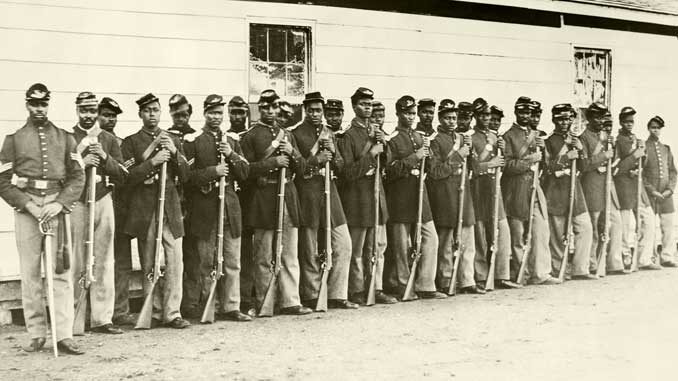
Stacy M. Brown NNPA Newswire Senior National Correspondent
Earlier this week the nation celebrated Memorial Day, which is a day of reflection and remembrance for those who died while serving in the U.S. military. While the country honors those who made the ultimate sacrifice for the nation. There is the untold story of African Americans and their connection to this holiday.
Memorial Day has a deep historical connection to the African American community in the United States.
The holiday, which originated as Decoration Day, initially began when formerly enslaved individuals and their descendants gathered to honor and decorate the graves of Union soldiers who fought during the Civil War.
“Oddly, that’s a fact that I wasn’t fully aware of,” former U.S. Ambassador Andrew Young told the Black Press.
“It’s not surprising, though,” said Young, an American civil rights leader and hero.
Indeed, on a day when picnics, family outings, and other leisurely pursuits occur, the founders of Memorial Day meant for the occasion to honor African Americans newly freed from enslavement, and those who lost their lives fighting for freedom, said actor Wendell Pierce.
“We will never forget those brave and honorable souls,” Pierce stated.
 Famous DJ Donnie Simpson called the occasion “very different for me.”
Famous DJ Donnie Simpson called the occasion “very different for me.”
“While we honor those who gave their lives in service for this country, I can’t help but think of those African Americans who were massacred in Tulsa 100 years ago,” Simpson wrote on Twitter.
Author Christina Coles deadpanned, “The Civil War was over, and African Americans had founded Memorial Day in a ritual of remembrance and consecration. They were the true patriots.”
Ben Gold, a historian and founder of the real estate investment firm Recommended Homebuyers, said recognizing Black soldiers,’ and their families’ sacrifices and bravery is essential because it acknowledges their often-overlooked role in shaping the nation’s history.
“Commemorating Memorial Day with Black heroes in mind serves several critical purposes. First and foremost, it ensures that their stories are included and preserved within the broader narrative of the holiday,” Gold insisted.
He said that by highlighting Black service members’ courage, resilience, and contributions, America pays homage to their sacrifices and honors their memory.
Moreover, Gold asserted that it fosters a sense of inclusivity, promotes diversity, and enriches our collective understanding of the complex tapestry of American history.
“In my experience as an investor and developer, I have witnessed firsthand the power of recognizing and celebrating diversity,” Gold said.
“Just as the real estate industry thrives when it embraces inclusivity, so does our society when we acknowledge and appreciate the diverse perspectives and experiences of all those who have served our country.
“By featuring the stories of Black heroes in Memorial Day commemorations, we not only educate and inspire, but we also contribute to a more inclusive and united nation.”
Indeed, as noted in a Washington Informer editorial, the significance of African Americans in the holiday’s development and the numerous ideas regarding its origins may not be widely known.
Although the origins of Memorial Day trace back to the period following the Civil War, when some 620,000 soldiers lost their lives, the precise origins remain a source of controversy.
Several cities have staked claims to be the first to celebrate Memorial Day.
Still, a different narrative, perhaps more accurately, says that African Americans in Charleston, South Carolina, in 1865 were the true founders of the holiday.
Renowned historian David Blight, a Pulitzer Prize-winning author and American history professor at Yale University recounted a poignant commemoration in Charleston on May 1, 1865.
Organized by formerly enslaved people and white missionaries, Blight determined that the event occurred at a former racecourse that had served as a Confederate prison for Union soldiers during the war’s final year.
At least 257 prisoners had perished there, primarily due to disease, and were buried in unmarked graves.
Eventually, two dozen African American residents of Charleston meticulously rearranged the graves into orderly rows.
They erected a three-meter-tall white fence around them, creating what they called the ‘Martyrs of the Racecourse’ memorial.
“After the Confederate evacuation of Charleston Black workmen went to the site, reburied the Union dead properly, and built a high fence around the cemetery,” Blight documented.
“They whitewashed the fence and built an archway over an entrance on which they inscribed the words, ‘Martyrs of the Racecourse.’”
He continued:
“The symbolic power of this Low Country planter aristocracy’s bastion was not lost on the freed people, who then, in cooperation with white missionaries and teachers, staged a parade of 10,000 on the track.”
The gravesites were transformed into a breathtaking “sea of flowers,” as described by the New York Tribune, and the event was hailed as a procession of mourning and remembrance, unlike anything South Carolina or the United States had witnessed before.
Despite documented evidence about this event, the narrative of African Americans being the founders of Memorial Day essentially went untold.
“That’s the surprising part,” said Ambassador Young, a civil rights icon who also served as mayor of Atlanta from 1981 to 1990.
“It’s history I want to read and know more about, and everyone else should as well.”
Recommended For You.



Be the first to comment